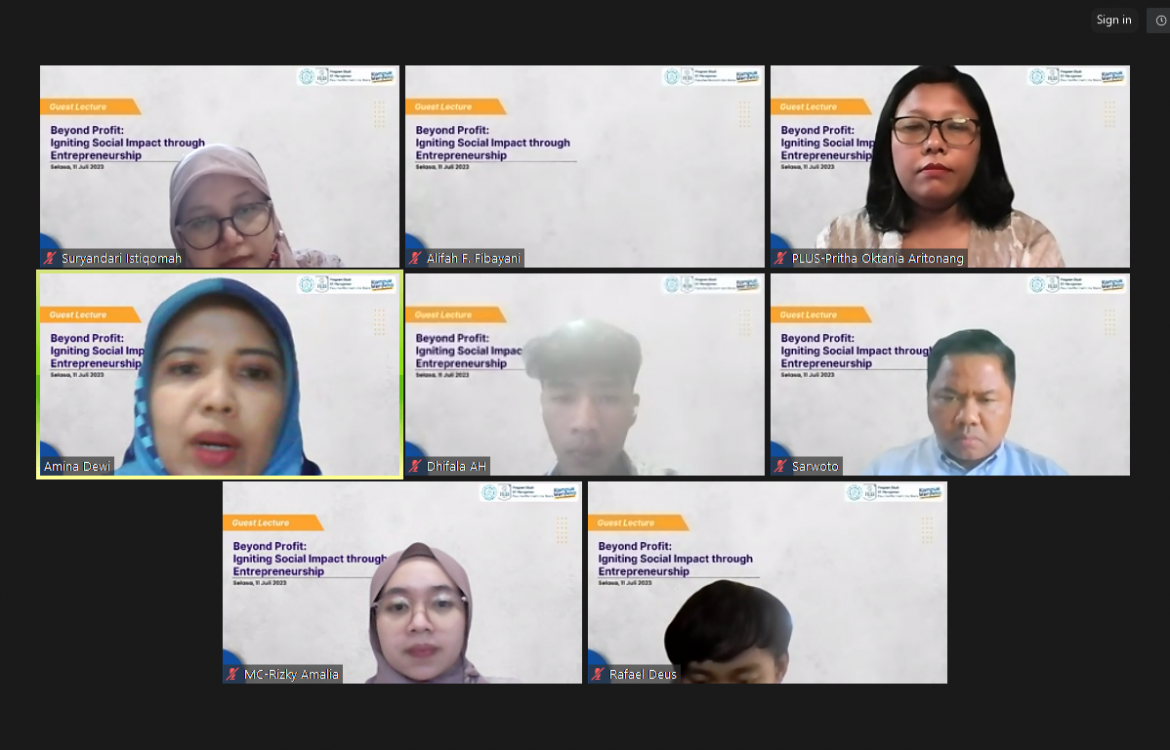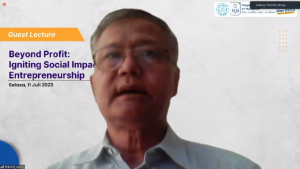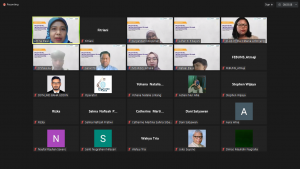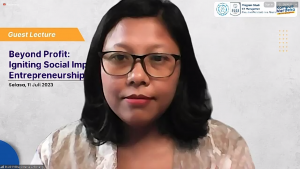
Social Entrepreneurship, A New Step Toward Sustainable Business
Seeing the potential of achieving business growth beyond profit and including social impact through social entrepreneurship, the Bachelor in Management (S1) Study Program (MSP FEB UNS) hosted a Guest Lecture entitled “Beyond Profit: Igniting Social Impact Through Entrepreneurship.”
Presenting Pritha O. Aritonang, Project Coordinator at the Platform Usaha Sosial (PLUS), the guest lecture session held on Tuesday (11/07/2023) was virtually attended by more than 100 participants consisting of students and lecturers of the Management Study Program, Faculty of Economics and Business (FEB), Universitas Sebelas Maret (UNS).
 Opening the guest lecture session, Dr. Atmaji, MM., Head of the Management Study Program, delivered an opening remark as well as officially started this guest lectures session. Through his speech, Dr. Atmaji expressed his gratitude and wishes, especially to Mrs. Pritha who has been willing to take her precious time for delivering some insights, at the same time hoping that the material will enlighten PSM FEB UNS students on the current condition of social entrepreneurship.
Opening the guest lecture session, Dr. Atmaji, MM., Head of the Management Study Program, delivered an opening remark as well as officially started this guest lectures session. Through his speech, Dr. Atmaji expressed his gratitude and wishes, especially to Mrs. Pritha who has been willing to take her precious time for delivering some insights, at the same time hoping that the material will enlighten PSM FEB UNS students on the current condition of social entrepreneurship.
“Currently, PSM always hosted face-to-face lecture sessions with guest lecturers. This aims to allow students to get knowledge from lecturers and practitioners or other academics who can provide a wider discourse for the material being studied. Thank you to all the participants, students and lecturers. I hope that students can follow the event carefully in order to reap the greatest benefits. Hopefully, this morning’s event can be held seamlessly and provide maximum benefits for students,” hoped Dr. Atmaji.
Starting the presentation on Social Entrepreneurship (SE), Pritha said that there are fundamental differences between ordinary businesses, non-profit organizations or NGOs, and SE. “In non-profit organizations, there are no material benefits, while SE is focused between financial benefits and social impacts. The potential for social enterprises to be sustainable is greater than NGOs since it can generate its own income and not be dependent on grants,” Pritha explained.
Social entrepreneurship itself can be defined as a movement that aims to make social change in the community, through responsible business practices that create a sustainable impact. Thus, the purpose of the said business is not only to generate profits but also to make a positive impact. According to her, the focus of SE triggers managers to grow the unique value to be offered to consumers. “Social enterprises can also focus on their own business income and are not dependent on grants. This is what makes social enterprises more sustainable,” she added.
Sharing her experience as a part of the ecosystem, Pritha also explained three types of Social Entrepreneurship seen by its beneficiaries, including embedded models, integrated models, and separated models. In order to determine whether a business qualifies as a Social Enterprise, there are five steps that can be followed. The first step involves understanding the activities of the business. The second step requires identifying the consumers and target audience of the business. The third step involves recognizing any issues faced by the organization. The fourth step necessitates determining the sources of revenue for the business. The final step involves comprehending the objectives of any changes that the organization or business seeks to implement.
 In Indonesia, there is an increasing trend in the number of social businesses with the number of businesses established reaching almost more than 100 businesses in 2017. The majority of these businesses are engaged in the field of creative industries, followed by the agricultural and fisheries sectors, as well as education. However, according to data presented by Pritha, the distribution of social business is still centralized on Java. Where the majority of social entrepreneurs (47%) stated that the most frequent challenge faced was the lack of capital. In addition, they also stated that there are still difficulties in accessing funding sources and difficulties in improving managerial skills.
In Indonesia, there is an increasing trend in the number of social businesses with the number of businesses established reaching almost more than 100 businesses in 2017. The majority of these businesses are engaged in the field of creative industries, followed by the agricultural and fisheries sectors, as well as education. However, according to data presented by Pritha, the distribution of social business is still centralized on Java. Where the majority of social entrepreneurs (47%) stated that the most frequent challenge faced was the lack of capital. In addition, they also stated that there are still difficulties in accessing funding sources and difficulties in improving managerial skills.
During the guest lecture, several participants appeared eager to engage in direct discussions with the speakers. A few students even mentioned their attempts at establishing a social business and sought guidance and recommendations from Mrs. Pritha, the Project Coordinator on the Platform Bisnis Sosial.

